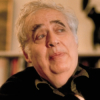Harold Bloom

Harold Bloom
Harold Bloomis an American literary critic and Sterling Professor of Humanities at Yale University. Since the publication of his first book in 1959, Bloom has written more than 20 books of literary criticism, several books discussing religion, and a novel. He has edited hundreds of anthologies concerning numerous literary and philosophical figures for the Chelsea House publishing firm. Bloom's books have been translated into more than 40 languages...
NationalityAmerican
ProfessionTeacher
Date of Birth11 July 1930
CountryUnited States of America
Reading the very best writers—let us say Homer, Dante, Shakespeare, Tolstoy—is not going to make us better citizens. Art is perfectly useless, according to the sublime Oscar Wilde, who was right about everything. He also told us that all bad poetry is sincere. Had I the power to do so, I would command that these words be engraved above every gate at every university, so that each student might ponder the splendor of the insight.
What matters in literature in the end is surely the idiosyncratic, the individual, the flavor or the color of a particular human suffering.
Socrates, in Plato, formulates ideas of order: the Iliad, like Shakespeare, knows that a violent disorder is a great order.
We can be reluctant to recognize how much of our culture was literary, particularly now that so many of the institutional purveyors of literature happily have joined in proclaiming its death. A substantial number of Americans who believe they worship God actually worship three major literary characters: the Yahweh of the J Writer (earliest author of Genesis, Exodus, Numbers), the Jesus of the Gospel of Mark, and Allah of the Koran.
I think the Greek New Testament is the strongest and most successful misreading of a great prior text in the entire history of influence.
At our present bad moment, we need above all to recover our sense of literary individuality and of poetic autonomy.
The idea of Herman Melville in a writing class is always distressing to me.
I won't say he [Shakespeare] 'invented' us, because journalists perpetually misunderstand me on that. I'll put it more simply: he contains us. Our ways of thinking and feeling-about ourselves, those we love, those we hate, those we realize are hopelessly 'other' to us-are more shaped by Shakespeare than they are by the experience of our own lives.
Personality, in our sense, is a Shakespearean invention.
I realized early on that the academy and the literary world alike - and I don't think there really is a distinction between the two - are always dominated by fools, knaves, charlatans and bureaucrats. And that being the case, any human being, male or female, of whatever status, who has a voice of her or his own, is not going to be liked.
There is a God, and his name is Aristophanes.
Hamlet, Kiekegaard, Kafka are ironists in the wake of Jesus. All Western irony is a repetition of Jesus' enigmas/riddles, in amalgam with the ironies of Socrates.
The true use of Shakespeare or of Cervantes, of Homer or of Dante, of Chaucer or of Rabelais, is to augment one's own growing inner self. . . . The mind's dialogue with itself is not primarily a social reality. All that the Western Canon can bring one is the proper use of one's own solitude, that solitude whose final form is one's confrontation with one's own mortality.
We possess the Canon because we are mortal and also rather belated. There is only so much time, and time must have a stop, while there is more to read than there ever was before. From the Yahwist and Homer to Freud, Kafka, and Beckett is a journey of nearly three millennia. Since that voyage goes past harbors as infinite as Dante, Chaucer, Montaigne, Shakespeare, and Tolstoy, all of whom amply compensate a lifetime's rereadings, we are in the pragmatic dilemma of excluding something else each time we read or reread extensively.